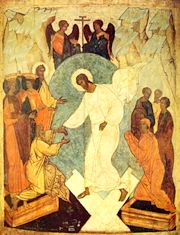Pascha
Pascha, also called Easter, is the feast of the Resurrection of the Lord. Pascha is a transliteration of the Greek word Πασχα, which is itself a transliteration of the Hebrew pesach, both words meaning Passover. (A minority of English-speaking Orthodox prefer the archaic English word Pasch.)
Pascha normally falls either one or five weeks later than the feast as observed by Christians who follow the Gregorian calendar. However, occasionally the two observances coincide. The reason for the difference is that the older Julian calendar uses a different paschalion, the formula for calculating the date of Pascha. This formula was determined by the First Ecumenical Council.
The Term Easter
Some Orthodox Christians discourage the use of the word Easter, believing that the term has roots in pagan rites of the spring equinox and overtones of fertility. Most English speakers are unaware of the etymological origins of Easter, however, and use it without any sense of pagan connotations, and so Easter is also used by many Orthodox English speakers.
The origin of the term Easter comes from the Germanic name for the month in which the Christian feast usually fell, and so, just as the American civic holiday of the Fourth of July has nothing to do with Julius Caesar for whom July was named, neither does Easter have anything to do with the pagan goddess Eostre, the namesake of the month in which Pascha fell. This potential difficulty only exists for speakers of Germanic languages, however. Most languages in the world use a cognate form of the Greek term Pascha and so are ignorant of any pagan connotations for the name of the feast.
Pascha and Natural Religion
There is, however, a connection which may be drawn between the pre-Christian celebrations and the feast of the Resurrection of Christ. Just as Christ's incarnation is the ultimate fulfilment of the best hopes of all "natural" religion, so can Pascha be understood as being the ultimate springtime of mankind. The pre-Christian celebrations of the renewal of creation in the Spring find their completion in the Resurrection, the passage from death to life of the incarnate Son of God, and with him all creation.
